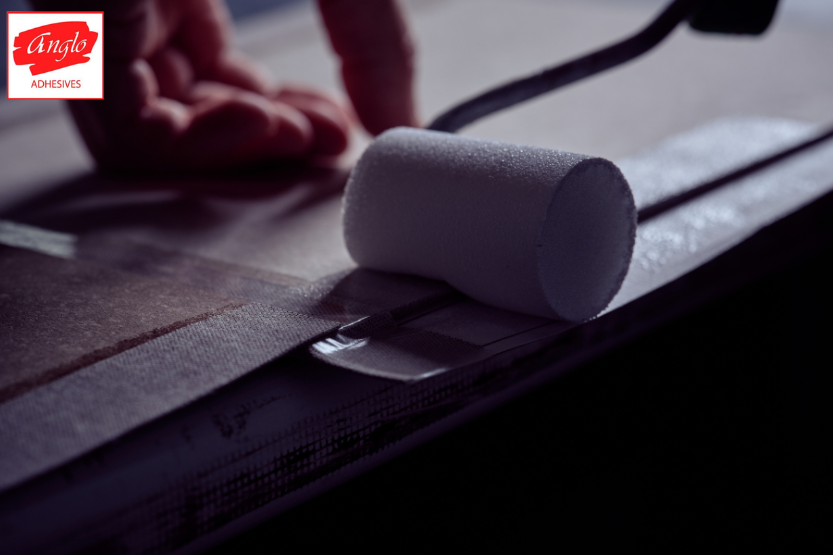Blog
How to Choose the Right Fabric Adhesive Glue for Your Industry

Selecting the correct fabric adhesive glue is crucial for ensuring the longevity and performance of your product. This guide will explore four primary types of fabric adhesive glue: polychloroprene contact adhesive, natural rubber contact adhesive, water-borne PVA adhesive, and SBR-based adhesive. By understanding the unique properties and applications of each, you can make informed decisions to optimise your manufacturing process.
What is Fabric Adhesive Glue?
Fabric adhesive glue is a specialised formulation designed to create robust bonds between textiles and other materials. Thus, the ideal adhesive for a project hinges on the specific demands of the industry involved. Crucial for industries such as foam furniture, fancy goods, footwear, and leather, the correct adhesive ensures product longevity, aesthetic appeal, and performance. From the robust demands of upholstery to the precise requirements of footwear construction, the choice of adhesive is pivotal in achieving desired results.
Polychloroprene Contact Adhesive
Polychloroprene contact adhesive, often referred to as neoprene rubber cement, is a solvent-based adhesive renowned for its strong bonding properties. Hence, it excels at creating durable bonds between various materials, including fabrics, rubber, and metal. This adhesive excels in demanding applications such as foam furniture, footwear, and leather goods. Its robust bond withstands the rigours of everyday use and exposure to diverse environmental conditions. However, due to its solvent content, it’s crucial to work in a well-ventilated area to maintain good air quality.
Natural Rubber Contact Adhesive
Natural rubber contact adhesive shares similarities with polychloroprene in being a solvent-based adhesive, but it offers distinct properties. Renowned for its elasticity and flexibility, natural rubber adhesive provides exceptional adhesion to fabrics, rubber, and leather. While its bond strength might not match that of polychloroprene in all applications, it excels at creating flexible and durable joints. This makes it a preferred choice for industries such as footwear, upholstery, and crafting, where adaptability and comfort are paramount.
Water-Borne PVA as Fabric Adhesive Glue
Water-borne PVA adhesive presents a sustainable and user-friendly alternative to solvent-based options. This environmentally conscious adhesive, composed of polyvinyl acetate and water, emits minimal volatile organic compounds (VOCs), making it ideal for indoor environments. Its versatility shines through its compatibility with a wide range of fabrics, including cotton, polyester, and nylon. While not as robust as its solvent-based counterparts in all applications, PVA adhesive compensates with its ease of use, clean application, and rapid drying time. Also, these attributes make it a popular choice for various industries, from textile manufacturing to crafts.
SBR-Based Adhesive
SBR-based adhesive is a water-based option known for its versatility. It offers a strong balance of adhesion and flexibility. It effectively bonds a wide range of materials, including fabrics, wood, and metal, making it a popular choice for construction, flooring, and textile applications. While not as robust as solvent-based alternatives, SBR adhesives excel at providing durable yet flexible bonds. Their water-based composition makes them a more environmentally friendly choice compared to their solvent-based counterparts.
Key Considerations When Selecting Fabric Adhesive Glue
Several factors determine the best fabric adhesive glue for your specific needs:
- Substrate Compatibility: Ensure the adhesive adheres effectively to the specific fabrics or materials involved in your project. Different adhesives have varying degrees of compatibility with different substrates. Factors such as fabric type, finish, and thickness can influence adhesive selection.
- Bond Strength: Evaluate the necessary bond strength based on the intended use of the product. For instance, an adhesive used for upholstery requires a strong bond to withstand daily wear and tear, while a bond for a delicate garment might require a more flexible adhesive.
- Flexibility: Consider if the adhesive needs to accommodate movement or stretching. For applications like footwear or sportswear, a flexible adhesive is crucial to prevent cracking or delamination.
- Environmental Conditions: Assess the potential exposure of the finished product to various environmental factors. For outdoor applications, consider resistance to water, sunlight, and extreme temperatures. For indoor use, focus on factors like humidity and temperature fluctuations.
- Health and Safety: Prioritise the well-being of workers and consumers by selecting an adhesive with minimal health risks. Consider factors such as VOC emissions, flammability, and skin irritation. Adhere to relevant safety guidelines and provide proper training for adhesive handling.
- Regulatory Compliance: Ensure that the chosen adhesive complies with all applicable industry regulations and standards. This includes factors like chemical restrictions, labelling requirements, and environmental regulations. Failure to comply can result in legal problems and product recalls.
Fabric Adhesive Glue: Testing is Key
Before committing to a large-scale production run, it’s essential to conduct thorough testing. This involves applying the adhesive to sample materials under various conditions to evaluate its performance. By carefully considering these factors and conducting appropriate testing, you can select the ideal fabric adhesive glue to enhance your product’s quality and durability. Remember, this is a general guide. Always consult with adhesive manufacturers for specific recommendations and safety information.
Enhance Your Project with Expert Adhesive Solutions
Selecting the appropriate fabric adhesive glue is a critical decision that significantly impacts product quality and longevity. By carefully considering factors such as substrate compatibility, bond strength, flexibility, environmental conditions, health and safety, and regulatory compliance, you can optimise your adhesive selection. Remember, each industry has unique demands, and it’s essential to conduct thorough testing before full-scale implementation.
Anglo Adhesives offers a comprehensive range of fabric adhesive glues tailored to diverse industry requirements. Our expertise and commitment to quality ensure that you find the perfect solution for your specific needs. By partnering with us, you can achieve optimal bonding results and enhance the overall performance of your products.